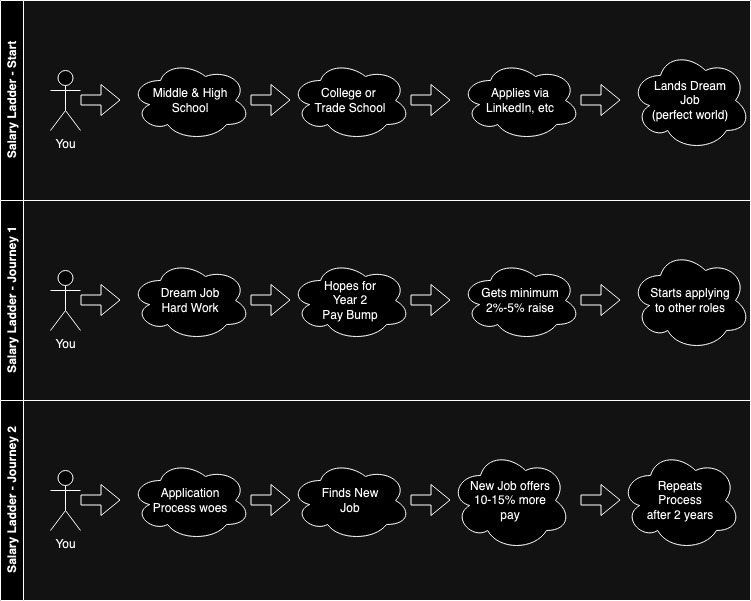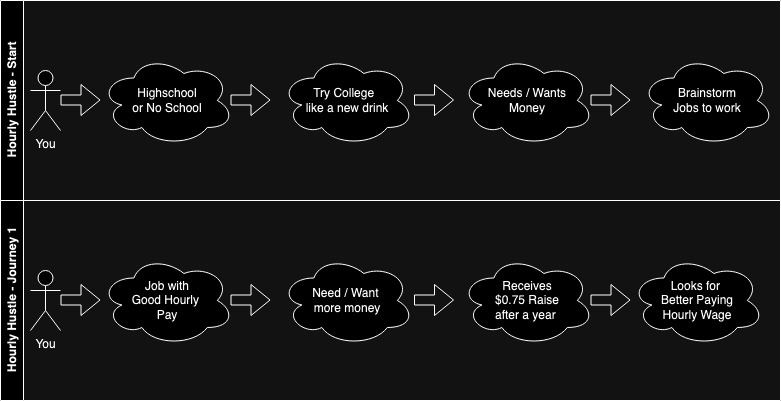Making Money?
Making and saving money feels great, but you know what’s even better? Finding ways to make more money. Whether you’re earning a salary, working hourly, or charting your own path through a side hustle or business, there’s always room to grow your income. Each route comes with its own opportunities and challenges, and the key is figuring out what works best for you.
In this article, we’ll explore practical strategies for boosting your income, whether you’re climbing the salary ladder, maximizing your hourly wage, or taking the DIY (Do It Yourself) approach to create your own streams of income. No matter where you are in your journey, let’s dive into actionable ways to make more money and take control of your financial future.
Climbing the Salary Ladder
Ah yes, the salary ladder—so appealing, so renowned, and yet, not as straightforward as it once seemed. While it’s still a tried-and-true way to earn steady income, navigating this path has its challenges in today’s job market. For years, many of us have heard, “Go to school, get a degree, and you’ll land a great job!” While the narrative may not fit everyone, the salary route remains a dependable path to financial stability and to earn a steady reliable income.
From my experience in the salary world over the past six years, I’ve observed clear patterns in how people boost their pay. High performers, for example, often secure raises after just three months of exceptional results paired with some savvy negotiation. Others achieve a 10-15% raise after consistently exceeding expectations for a year or two.
However, the most common strategy for making more money in this route is job-hopping. After a year or two in a role, many people take the skills they’ve built, market themselves to other companies, and land a 10-15% pay increase—far better than waiting around for the standard 2-3% annual raise. It’s important to note that pay increases vary widely by industry. For instance, tech jobs often offer significant room for growth and pay bumps when switching roles, while accounting roles may follow more traditional paths with less frequent opportunities for raises. In healthcare, it often depends on your specialization—nurses and tech specialists might see different dynamics. If you possess foundational skills employers value, you’re in a strong position to negotiate better pay when moving to a similar job at a different company.
Here’s the thing: working harder doesn’t always guarantee bigger paychecks. Instead, focus on working smarter—master the fundamentals of your role, learn to market yourself effectively, and don’t shy away from seizing new opportunities. The salary ladder rewards not just effort, but strategy.
💭 Key Takeaway: Growing your income isn’t just about working harder—it’s about working smarter, leveraging skills, and seizing opportunities like job-hopping or strategic negotiations.

The Hourly Hustle
Then there’s the hourly wage—the classic “money for time” method. For many, this is the go-to starting point, whether working as a driver, retail associate, or in any number of service roles. Often, it’s a practical way to cover immediate needs and afford a chosen lifestyle. For those who embrace simplicity or minimalism, this can be an ideal income model—work the hours you need and focus on living within your means.
But let’s be real: increasing your hourly pay isn’t always straightforward. Employers in hourly roles often have strict wage structures, leaving little room for negotiation. The most effective way to boost your pay in this category? Find a similar job that offers a higher rate. For instance, someone working retail might find a higher-paying opportunity at a store in a more upscale area or with a company that values experience differently.
Why would one employer pay more for the same role? It boils down to factors like industry, location, and the employer’s revenue or priorities. A cashier at a high-end grocery store in a big city may earn significantly more than one at a small-town chain. Even though the roles are nearly identical, the perception of value can differ greatly. In competitive markets, employers may prioritize retaining top talent by offering higher wages—especially when skills like customer service are in high demand.
If your current job offers little potential for pay bumps, consider exploring other industries. Consider exploring industries where your skills are a match with better-paying roles. For example, customer service experience in retail could transition smoothly into hospitality or even tech support roles. With a bit of effort and exploration, you might uncover opportunities in fields that reward your time and skills more generously.
💭 Key Takeaway: Maximizing hourly income often means switching to higher-paying employers or industries that value your skills more competitively.

DIY: Your Own Boss
Now for the most exciting (and daunting) route: the DIY path. This is for the bold souls who say, “No thanks, I’ll take my talents elsewhere.” Entrepreneurs, creators, and side hustlers all belong to this dynamic category
The beauty of this approach is the flexibility to scale income over time, depending on skill and demand. Sure, you might test 10 ideas that fail, but one good idea can offset those losses and open the door to lasting success. It could be something as straightforward as selling T-shirts with a unique design, offering freelance services, or launching a small business like massage therapy. Each of these ventures has the potential to scale, driven by factors like skill, reputation, and yes, a bit of luck.
The key to thriving in the DIY space is identifying your strengths, pinpointing a market need, and executing a solid marketing strategy. While the risks are undeniably higher, the rewards can be transformational—not just financially but in terms of personal fulfillment and independence.

Which Path Is Right for You?
So, which is the best route: climbing the salary ladder, trading time for money, or venturing into the DIY world? The truth is, there’s no one-size-fits-all answer. However, there’s a natural progression that works for many:
- Start with hourly work – It’s often the fastest way to start earning while giving you the flexibility to figure out what’s next.
- Move into a salary role – Once you’ve identified an industry or skill set that excites you, salary jobs tend to offer more stability and the potential for higher annual income.
- Pursue the DIY path – If you have a product, service, or idea you’re passionate about, entrepreneurship can be the most rewarding—and often the most unpredictable—option.
No matter which path you choose, the most important thing is to take action. Do the research, experiment with new opportunities, and don’t be afraid to pivot if something isn’t working. The journey to financial success is personal, and it should align with your goals and aspirations.
Final Thoughts
Making more money isn’t just about luck or hard work; it’s about strategy. Whether you’re earning by the hour, climbing the salary ladder, or betting on your own ideas, there are often multiple paths forward, depending on your goals and approach. The key is to take that first step, stay curious, and remain flexible. So, what’s your next move?
“The Biggest Risk, Is Not Taking Any Risk” – M. Zuckerberg
💭 Main Takeaway: Making more money isn’t about choosing a single path—it’s about strategy. Whether earning through salary, hourly wages, or entrepreneurship, the key is to take action, explore new opportunities, and remain flexible in adapting to changing circumstances. Financial growth comes from informed choices, smart risk-taking, and continuous learning. What’s your next move?







